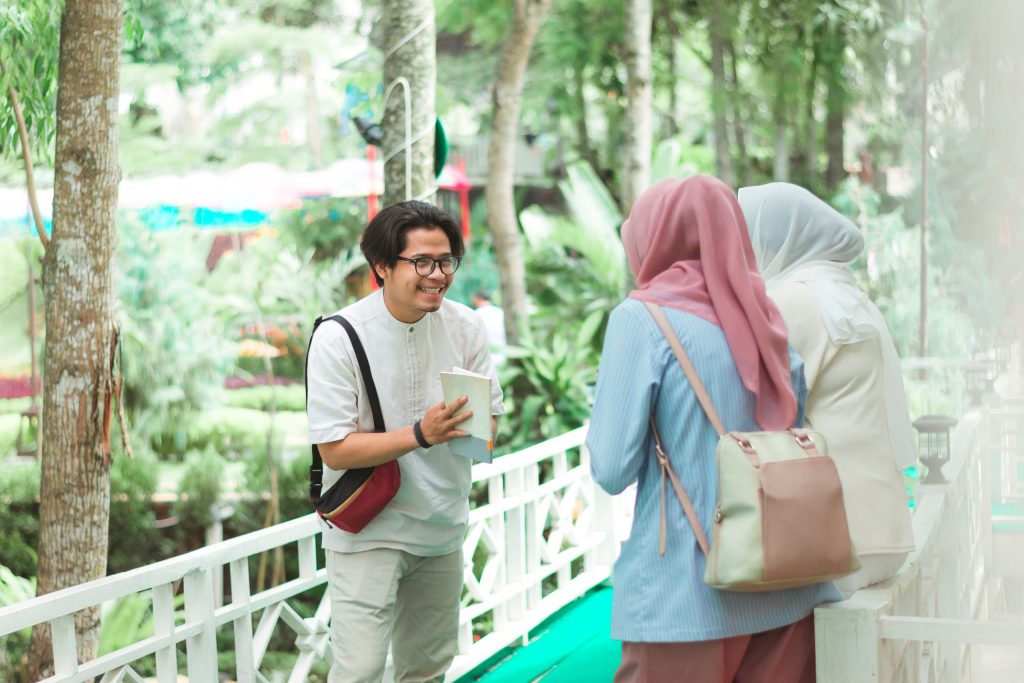When traveling in Indonesia, learning how to say hello in Indonesian (Bahasa Indonesia) will be helpful. Although you can use “hi” and “hello” in English, using basic Indonesian greetings can make your interactions more pleasant, especially in places like Sumatra, where you will hear “Hello, mister!” everywhere you go.
Knowing how to greet people in their native language can help you overcome cultural barriers, which apply beyond just Indonesia. For example, demonstrating curiosity in people can significantly impact you and distinguish you from tourists who only want to socialize with fellow travelers. In addition, knowing how to greet locals in their native language can help you establish a stronger connection with a place.
About the Language
Compared to tonal Asian languages like Thai or Mandarin Chinese, it’s relatively easy to learn Bahasa Indonesia, the official language of Indonesia. Additionally, Bahasa uses the 26-letter Latin alphabet, familiar to native English speakers. You can learn a few new words by reading signs.
Most words are pronounced according to their spelling, except “c,” being pronounced as “ch.” In contrast to English, the pronunciation of vowels follows straightforward and consistent rules.
When and how should you say hello in Indonesia?
In Indonesia, honorifics are not commonly used as a part of the culture of respect. Similar to English greetings, Indonesian greetings have no formal variations for older individuals or those with a higher social status.
First, even if you don’t follow the local customs, you won’t be punished. However, it would be appreciated if you greet any older individuals first and avoid making intense eye contact. It is essential to avoid eye contact for too long when shaking hands, even in Indonesia.
In contrast to Westerners, Indonesians prefer light handshakes, sometimes accompanied by a very slight nod or head nod. To show respect for someone’s culture, you can respond with the same gesture when they greet you with the wai gesture (a little bow with palms together in front of the chest).
Saying Hello
In Indonesia, you don’t have to use formal honorifics or titles of respect when addressing people of different ages, unlike in some other Asian languages. In Indonesian culture, it is customary to use the same greeting for everyone, regardless of age, gender, or social status. However, showing respect by greeting elders first and avoiding prolonged eye contact is essential.
To the four greetings in Bahasa Indonesia, start with the word “Selamat” (pronounced: “such-lah-mat”). Then, however, select the proper greeting based on the time of the day. The term “Selamat” means happiness, peace, and safety.
Indonesian greetings for different times of day
The Indonesian language has specific greetings for different times of the day, similar to many other languages. However, unlike in English, where we start with “good,” in Indonesian, we use “Selamat” to wish individuals a “happy,” “peaceful,” or “safe” day.
Selamat pagi! — Good morning!
“Selamat” is used with “pagi” to greet someone in the morning. It translates to “Good morning” or “Peaceful/Happy morning.” This informal greeting is appropriate until around 11 am or 12 pm.
Selamat siang! — Good day!
The word “siang” means “day” in English. Combined with “Selamat,” it translates to “good day.” This greeting is typically used to greet people from 11 am or 12 pm until around 4 pm.
Selamat sore! — Good afternoon!
The term “sore” literally means “afternoon” in Indonesian. Therefore, “Selamat sore” can be translated as “Good afternoon.” This greeting is usually used between 4 pm and 6-7 pm, depending on the available daylight.
Selamat malam! — Good evening!
The word “malam” means “night” or “evening” in English. Therefore, the phrase “Selamat Malam” translates to “good night” or “good evening.” Consequently, it is appropriate to use this greeting after sunset or around 6 or 7 pm.
The phrase “Selamat petang” can be used formally to say “good evening,” but it’s more commonly used in Bahasa Malaysia.
Selamat tidur! — Good night!
Selamat tidur can also be used to say “good evening,” but only when someone is going to bed or going to sleep.
Saying Goodbye in Indonesian
Learning how to say goodbye correctly in Indonesia will help end the interaction on a friendly note now that you’ve learned to say hello.
To bid farewell to someone you don’t know, it is appropriate to use the following phrases:
Selamat tinggal (suh-lah-ma teen-gal) – Goodbye (when leaving)
The word “tinggal” means “to stay.” So when you’re the one saying goodbye and leaving, you can use this phrase.
Selamat jalan (suh-lah-ma jal-lan) – Goodbye (when staying)
The Indonesian word “Jalan” translates to “to go” and is the opposite of “Tinggal.” It is used to say “goodbye” when someone is leaving and you are staying behind.
Sampai jumpa! (sahm-pai joom-pah) – See you later!
A friendly way to say a proper goodbye, with the intention of meeting again. It can be used whether you’re leaving or staying.
Jumpa lagi (joom-pah log-ee) – Meet you later
You can use this phrase to say goodbye and indicate that you want to see the person again, whether you’re leaving or staying.
Shaking Hands
When greeting Indonesians, be aware that their handshakes are more like a touch than a firm grip. Unlike in the West, they do not usually make firm eye contact during the handshake. Avoid squeezing their hand too hard, as it can be seen as aggressive. It is customary to briefly touch your heart as a sign of respect after shaking hands.
The wai hand gesture, which involves placing palms together at the chest, is familiar in Thailand and some other Buddhist countries but less in Hindu and Buddhist areas of Indonesia. If someone offers you the gesture, you can respond in kind.
A smile and a firm handshake in Japan are good greetings; a profound bow is not required. However, it’s customary to slightly bow your head when shaking hands with someone older to show more respect.
Other Useful Ways to Say Hello in Indonesian
There are other ways to greet someone in Indonesian besides just saying hello. Below, we’ve provided a list of these different ways. If you’re finding it challenging to learn these greetings, take a break and research effective language learning methods.
Apa kabar? – How are you?
Interestingly, although the literal translation of “apa kabar” is “what news” or “what’s the news,” it is commonly used as a greeting to ask someone how they are doing. The user can reply with “Baik,” which means “Well” or “Good.” They can also say “Baik baik” if they want to repeat it. Alternatively, they can say “Tidak bagus” or “Tidak baik,” meaning someone is not doing well.
Bagaimana harimu? – How is your day?
An excellent way to greet someone is by asking how their day is going. In Indonesian, “bagaimana” means “how,” and “harm” means “your day,” so by combining these words, you get the greeting “How is your day?”. The responses to this phrase are similar to “How are you.”
Senang bertemu denganmu! – Nice to meet you!
This greeting is commonly used when meeting someone for the first time. However, if you want to greet your new colleague more formally, you can say “senang bertemu dengan Anda” (pronounced “Seh-nan Burt-eh-moo deh-gang ahn-dah”).
Senang bisa bertemu dengan Anda lagi – It’s nice to see you again.
This greeting can be used for someone you have already met before.
Asking How Someone Is Doing
To add more substance to your greeting in Bahasa Indonesia, you can ask someone how they are doing. The standard way to say this is “apa kabar,” which translates to “How are you?” The literal direct translation here is “What’s new / What is the news?”
The correct answer is “baik” (pronounced like “bike”), which means “well” or “good.” Sometimes it is repeated twice as “baik, baik.” Be careful if the person you’re asking responds with “tidak bagus” or “tidak baik,” as it means “not good.” And if they say “saya sakit,” it means “I’m sick!”
The best response to the question “Apa kabar?” is “kabar baik,” which means “I am fine/well” and can also be translated as “good news.”
Learn Indonesian today.
Knowing how to say “Hello” in Indonesian is a great starting point for learning the language. Additionally, if you plan on visiting Indonesia, being able to greet locals in their language can enhance your interactions and make them more enjoyable.
When traveling in Indonesia, locals like Bali, Jakarta, Java, and other areas are typically friendly with foreigners. They are particularly excited to hear foreigners respond in Bahasa Indonesia. You can easily connect with Indonesian residents by familiarizing yourself with some basic Indonesian greetings.
Learning Indonesian is quite simple. However, if you’re planning a visit or moving to Indonesia, learning some primary Indonesian phrases and proper greeting is essential to help you communicate with locals. Here are some standard greetings you can use in your daily interactions.


